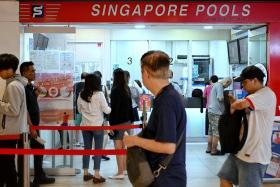Technology to help more gamblers set limits and reminders to stop
To promote responsible gambling, Singapore’s two casinos have rolled out a tool for their members to set time and budget limits for their gambling sessions.
When the limits are up, patrons will be approached by a casino staff member or receive a notification on their mobile phones.
This informed play system kicked in at casinos in Resorts World Sentosa (RWS) from February 2020 and Marina Bay Sands (MBS) from June 2022.
The initiative is being progressively rolled out at some jackpot machine rooms, which are also working towards implementing measures such as offering patrons the option of getting win-loss statements.
The Ministry of Social and Family Development announced these measures on Oct 28, in line with the Responsible Gambling Awareness Week that runs till Nov 6.
It said in response to queries from The Sunday Times that these measures aim to establish good responsible gambling standards within the industry.
In addition to what casinos and jackpot rooms are doing, Singapore Pools set up a risk-profiling tool in 2021 for its account holders to monitor how much they have placed in bets and the payouts earned.
Tailored messages will be sent to these customers based on their online betting behaviour, such as a reminder if they are spending more than usual.
According to the National Council on Problem Gambling, the median monthly betting amount among Singaporeans decreased from $30 in 2017 to $15 in 2020, which could be due partly to Covid-19 restrictions on gambling activities.
Gambling participation rates – which measure the percentage of Singapore residents aged 18 and above who have participated in at least one form of gambling – has remained at around 50 per cent since 2005.
MBS executive director of responsible gambling Joseph Bufalino said the aim of the informed play system is to help patrons better control their time and money spent gambling in the casinos.
“(When the patron reaches the set limit), the decision to continue gambling, however, sits solely with the patron unless there are any other observable signs that raise concerns, like if they were to fall asleep at the table,” he said.
Mr Bufalino added that registration to set limits can be done online, so patrons do not have to worry about any associated stigma that may dissuade them from using the tool.
Mr Desmond Cheah, a responsible gambling ambassador at RWS, said the system lets patrons know when to take a break.
“When I approach them to tell them that they have reached their limits, patrons have expressed their appreciation (to me) for delivering the personal touch and service,” he said.
Those who work with problem gamblers said the new initiatives complement existing measures, such as applying for an exclusion order or casino visit limit, that help people manage their gambling behaviour.
An exclusion order bars an individual from entering casinos, jackpot rooms and gambling online with Singapore Pools. A visit limit restricts the number of times an individual can enter a casino each month, ranging from one to eight visits.
Ms Tham Yuen-Han, executive director at We Care Community Services, which runs support groups for problem gamblers, said it is good for people to practise self-monitoring and set limits before they get sucked into the game.
“When some people gamble, they are so absorbed in the thrill and excitement that they lose track of the amount of time and money spent,” she said.
“It is a good thing for gamblers to get a reminder telling them that they have to stop.”
Mr Andrew da Roza, a psychotherapist at Promises Healthcare, said the new measures will help prevent gamblers from falling into a gambling disorder – where individuals have an uncontrollable urge to keep gambling despite the toll it takes on their lives.
However, those who have a gambling disorder and face significant distress in their lives are not likely to benefit from these new measures.
“This group struggles to stop gambling and would avoid doing things like the assessment form or getting a win-loss statement because they don’t want to know how much money they are losing,” said Mr da Roza.
He added that it would be best if family members could apply for an exclusion order, or they could undergo professional therapeutic interventions.
Dr Thomas Lee, the medical director of Resilienz Clinic, said the self-assessment tool helps raise awareness among gamblers about whether they are at risk of crossing the line into addiction.
He added, however, that the informed play system at casinos applies to only electronic gaming machines, and not all games.
“A person could be gambling on a variety of games at the casino, both electronic and table games, which the system doesn’t fully capture,” said Dr Lee.
Get The New Paper on your phone with the free TNP app. Download from the Apple App Store or Google Play Store now

